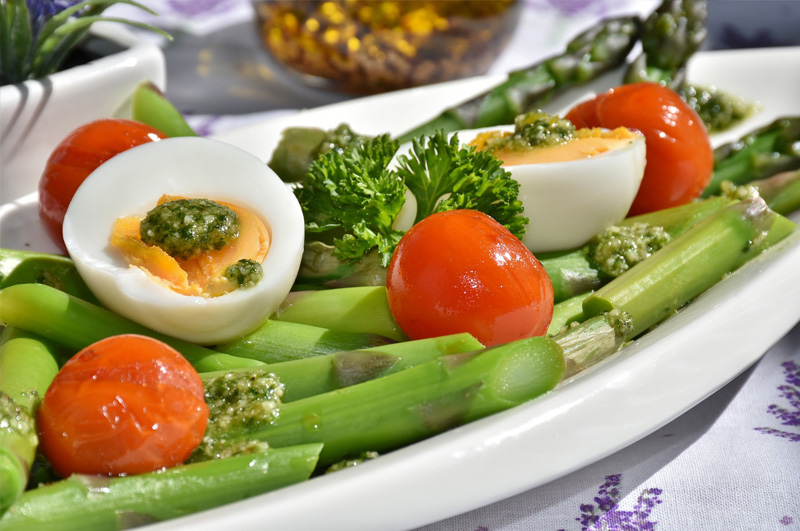Feeling bummed out, sad or suffering from depression? Not intended to replace medication or professional counseling, certain foods naturally have mood-boosting properties like vitamins or minerals that can alleviate stress, anxiety, fatigue and other psychological ailments. Some vegetables and fruits change in chemical composition after cooking, so make sure you’re preparing a meal to produce an ingredient’s desired effect or benefit. You can find tips about healthy food from this fat to fit infographic which gives you all you need to know about a balanced diet.
Swiss Chard
Forget kale and incorporate Swiss chard, a fellow leafy green with high amounts of magnesium and vitamin K, into your late summer and early autumn grocery list. With too little magnesium, you’re likely to experience increased stress and anxiety as your body produces unnecessary adrenaline, and adding more foods containing this mineral might help you sleep better and more soundly. Along with vitamins A and C, Swiss chard contains nitric oxide, which aids cardiovascular health and is also linked to a proper circadian rhythm. Cooked Swiss chard has much less Vitamin K than the raw leaves; this component helps brain function, especially regarding mood swings caused by menopause.
Cashews
Great as a snack or part of a salad topping, these fatty nuts possess an amazing level of manganese, a hard-to-get element that supposedly reduces irritability, mood swings and aids water retention. Cashews are great sources of vitamin K, iron, zinc, magnesium and thiamine, also known as B1, an essential vitamin for stopping fatigue, confusion and a healthy appetite—it’s said to help smokers and alcoholics kick addiction.
Asparagus
This delicious spring vegetable comes in many colors and can be used in all sorts of recipes, whether pickled, grilled or sautéed. High amounts of Vitamin K and plenty of fiber make asparagus a serious superfood and incredibly healthy, but a decent serving size also provides lots of folate (commonly called folic acid), which fends off anemia, depression and is required for healthy bodily function. When cooked, asparagus produced tryptophan, an amino acid that enables serotonin and melatonin (a sleep inducer) to work on the brain’s neurotransmitters.
Brazil nuts
Another fat-packed snack food, Brazil nuts in moderation yield amazing health benefits, including a collection of vitamins and minerals that keep one’s spirits soaring. Half a handful of nuts contain a day’s worth of manganese, magnesium, selenium, thiamine and phosphorus—in order for your body to process B vitamins in general, your system will need phosphorus, but too much of this element might cause kidney problems. High amounts of glutamic acid in Brazil nuts affect the GABA receptors, the part of the brain that facilitates relaxation and focus.
Oranges
Delightfully ubiquitous and always refreshing, oranges of all shapes and sizes are stuffed with calcium, potassium and vitamin C. Aside from serving as a potent antioxidant, high vitamin C levels are shown to heighten general happiness, work against mood disturbances and improve executive function, helping you to do more and enjoy doing those tasks. Even one large fruit will give you enough vitamin C to have a full, stress-free day.
Chickpeas
Also known as garbanzo beans, chickpeas are the main ingredient in hummus and can be used whole for a scrumptious and healthy Mediterranean salad. Coupled with manganese, folic acid, glutamic acid and zinc, a cup of chickpeas has a mighty dose of vitamin B6 (called pyridoxine in medication form), which regulates seratonin and norepinephrine production. Those two chemicals in the brain are responsible for anxiety attacks and proper responses to stress, so adding more B6 to your dietary intake will help social unease and heavy work pressure. There’s also a generous amount of mood-stabilizing tryptophan in each serving, making this often-canned legume a great choice for aiding mental health.
Oats
To start your day off on a happy foot, consider making some oatmeal—it may surprise you to know that this classic breakfast dish contains tryptophan, glutamic acid, folate and plenty of manganese. Aiding digestion for a healthy gut, oats in general are a smart way to get a decent serving of fiber and selenium. Eating oatmeal in the morning will also get your body its share of thiamin/B1, leucine for muscle growth and iron (anemia and other iron-deficient disorders negatively affect mood and irritability).
Bananas
Contrary to popular belief, bananas have a relatively low potassium makeup, though this delicious and carb-filled fruit should get attention for its other beneficial qualities. In just one large banana, enjoy the mood-stabilizing effects of tryptophan, folate, phosphorus, magnesium, manganese, glutamic acid and B6—whew! Furthermore, some experts believe a high-carb diet is essential to maintain a healthy brain and mind, in conflict with many myths about blood sugar and energy crashes.
Spinach
Juice it, toss it in a salad or sauté spinach with shallots and garlic: this wonderful and versatile vegetable has many applications and loads of important properties for overall health. Spinach leaves contain incredible amounts of vitamin K, folate and manganese, as well as vitamin A: this component aids in increasing energy, regulating the thyroid and reportedly staving off depression and other mood disorders. There’s also glutamic acid and omega 3- and 6-fatty acids, all important for proper neural communication.
Raw chocolate/cocoa nibs
Chocolate is proven to have mood-boosting properties. Dark, unprocessed chocolate is known to have natural caffeine, but this dietary additive or treat also contains theobromine, a similarly structured compound that doesn’t affect the central nervous system and has relaxing effects—cocoa nibs have more of this bitter ingredient than caffeine does in its nutritional makeup. Straight from the cacao plant, the purer form of chocolate has varying amounts of tryptophan, mood-altering flavanoids, phenylethylamine (aiding the brain’s propensity to be excited by something), anandamide (known as the “bliss molecule” and similar to THC) and magnesium.
Conclusion
By including these foods in your diet, there’s no need to purchase supplements at the drugstore or supermarket. Putting thought into what you consume can change the way you see the world and how you feel each day, but be careful about not overdoing it with fatty nuts or overly potent minerals like manganese and phosphate.








